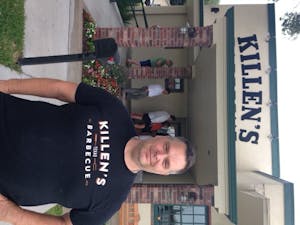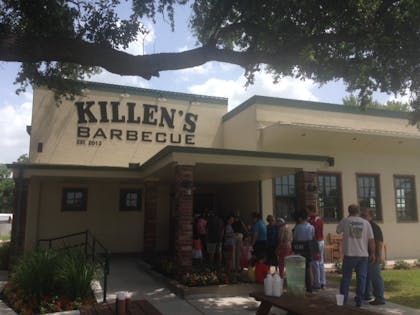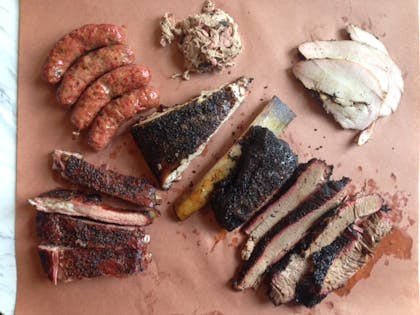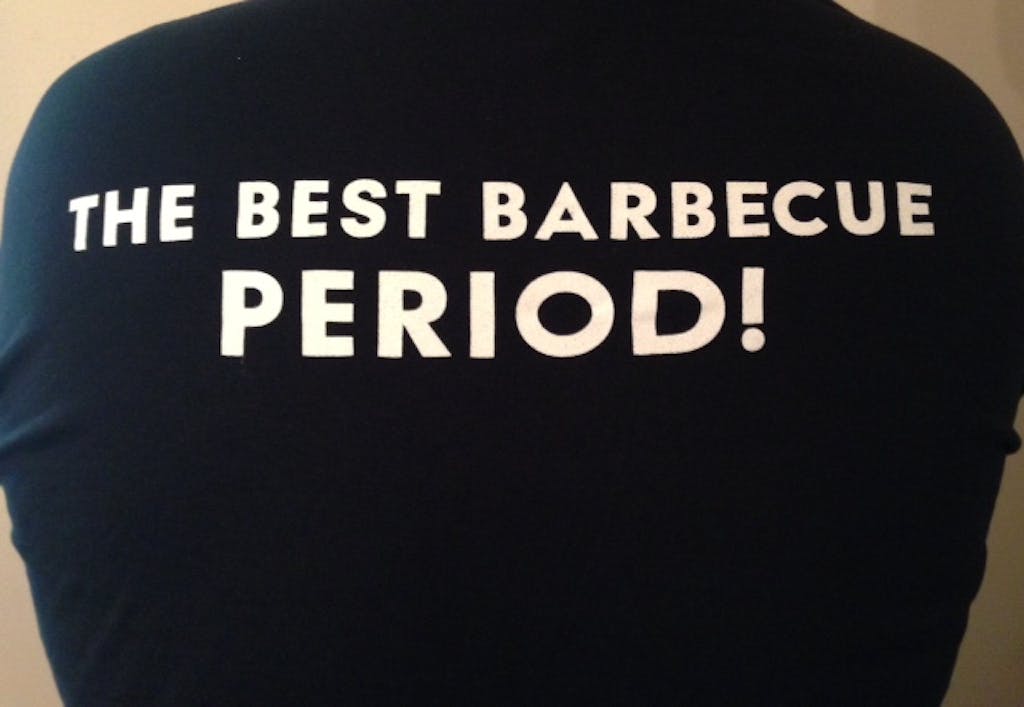 Owner/Pitmaster: Killen’s Barbecue; Opened 2014
Owner/Pitmaster: Killen’s Barbecue; Opened 2014
Age: 47
Smoker: Indirect Heat Wood-Fired Pit, Wood-Fired Rotisserie Smoker
Wood: Oak, Pecan, Hickory, and Mesquite
Last week, we reviewed Killen’s Barbecue in Pearland. It received one of the highest ratings on TMBBQ, which likely wasn’t enough for Ronnie Killen. His goal is to be “The Best Barbecue, Period!” according to the statement printed on the shirts at Killen’s Barbecue.
Killen has been working in restaurants for decades. He’s spent most of those years in fine dining, but Killen’s Barbecue is actually the third barbecue joint that he’s had a hand in. This one is certainly the most popular of the bunch with a long line stretching down the sidewalk nearly every day. After working as an executive chef in multiple five star hotels and owning his own highly acclaimed steakhouse, Killen is certain that running this barbecue joint is the hardest job he’s had.
We spoke a couple months ago because we needed to share some news with Killen that couldn’t be released until today. Be sure to read the interview all the way through for that important announcement about this year’s TMBBQ Festival.
Daniel Vaughn: How are things at the restaurant?
Ronnie Killen: It’s been very, very busy. I keep wondering if we can get busier, then we do.
DV: Have you seen a big change from the business you get on weekdays versus weekends?
RK: We still have lines, but they form a little bit later on the weekdays. Pretty much when we don’t have a line, we’re out of food. It’s shocking that the buzz is still here. I can’t complain at all. I never ever thought it would be this busy.
DV: How busy are you? How much meat are you cooking?
RK: On the weekdays we’re cooking 1500-1800 pounds. On the weekends we’re getting up to 2300 pounds.
DV: What’s it like running a new barbecue joint when you’ve got other restaurants to deal with at the same time?
RK: It’s tough. It’s a lot longer day. Before I did the barbecue my days were a lot easier. I’m getting a new pit here. It’s a Klose. It’ll hold about sixty briskets.
DV: The new pit is just to increase capacity for the restaurant?
RK: It’s to increase capacity, and to better the quality. Cooking the pork ribs on the Lang…I have to stuff them in there and it has hotspots. It’s hard when you have three pits operating with just three guys. It’s coming along. I do get a little more sleep these days.
DV: How did you get into this craziness of cooking barbecue?
RK: It’s something I did a long time ago. What dialed me back into it was a James Beard dinner that I did back in 2011. We did short rib there. It was a 123A, and we split it in half, smoked it for six hours, then sous vide it for forty-eight more. People flipped out over it. Then they asked me to come back and do a dinner called the “Art of Smoke”. Everything was smoked. The coolest thing we did was a deconstructed black forest cake, and we piped in cherry wood smoke into it and sealed it. When you pulled the paper off the smoke hit you in the face. Doing it made me think about what I did back in the nineties, and how far I’ve come in understanding the cooking of brisket. There are so many barbecue places in Houston where they just do it, and they don’t put a lot into it. I wanted to get back into it. On the weekends I was barbecuing every week. They say the key to success is doing something that you enjoy, and getting paid is just a bonus. I enjoy doing it, but did I think we were going to be this busy? I knew we’d have a following from the pop-ups, but this busy? I didn’t really know. I didn’t even think I’d need to bring the Lang up here, but I had to cook more food. I was getting hate emails telling me I was terrible and didn’t know how to run a business. We were cooking a lot of meat. I can’t help that we’re out when we’re out. We cook those briskets for fifteen hours.
DV: What did you say to those detractors?
RK: I’m not twisting anybody’s arm to stand in line. If you don’t want to be here, then exercise your choice and go somewhere else.
DV: Is that something you think is just a difference in attitude between Houston and Austin?
RK: Absolutely. In Austin, that’s just their culture. Here’s it like “we don’t have time for it,” but nobody’s forcing these people to stand in line. I stood in line at Franklin’s in Austin, and it was cool. You’re all there because you’re all looking forward to the experience. That’s the cool part. That’s what I wanted to do here. People get upset about it here. If I have brisket here at 5:00pm, I’m going to give it away. I’m not going to charge anybody for brisket that’s been sitting in the warmer for that many hours. Most people will sell out to the people or the dollar, but I’m not going to do that. I’m not going to sell junk. When it’s over, it’s over. If people get upset about it, they can go somewhere else where they cook in a big oven with a smoke injector. My first barbecue place that I had back in the nineties, I didn’t understand brisket and cooking, I didn’t have the whole chef background then. Did I serve brisket that wasn’t at its best then? Yes. I didn’t have the money to set it aside or discard it. I needed the sales. Now I don’t need to make money at this restaurant. My steakhouse does well. I didn’t open it to make a bunch of money. I do it because I love it. I want to bring something great to Houston. Will [Buckman] is doing good stuff at Corkscrew and I like Gatlin’s, but Houston is a big city. There’s room for more people.
DV: What was the name of the place you had back in the nineties?
RK: It was called Killen’s Country Barbecue. I’ve been in hospitality all my life. I helped my dad open a place called Killen Time, which was where the steakhouse is now. Six or seven months into it, a customer came in and said he had a strip center along 288 that he wanted to rent out. He wanted to know if I was interested. I could afford it. My dad had a big brick pit in the restaurant, so I figured I could just cook my stuff there and truck it up to the new place. We cooked chicken fried steaks and grilled steaks too. We got cheap Select steaks for $3.00 per pound, so we marinated the hell out of them and people loved them. I remember the first day of my barbecue place, we did $125 in sales. I was like “Alright, we sold twenty sandwiches today!” This past Saturday we did $5500 in one hour.
DV: Was Killen’s Country Barbecue and Killen Time open at the same time?
RK: Yes they were.
DV: So, you were in competition with your dad in the same town?
RK: Pretty much.
DV: How did that work out?
RK: It was fine. My dad only sold barbecue for lunch. He was known for his ribs. When I was a little kid I used to watch my uncle, and he taught me how to make sausage. We did everything from scratch.
DV: Was it growing up around it what made you want to got to culinary school?
RK: I went through a divorce in 1996, and I was like “what am I going to do?” I went to the Brownstone in Houston and applied to be a sous chef. I went in for the interview and they said “cook us three dishes right now.” I did, and I started working that night.
DV: What did you cook?
RK: I did veal medallions with portabellas and demi-glace along with au gratin potatoes with gruyere cheese. Then I made my bread pudding. My appetizer was quail that I bacon wrapped. To be honest, when I first saw the veal, I thought it was pork because it was so light. Back then I just didn’t know. At one point Frank Sinatra came in, then I went to cook for him in his kitchen. I thought it was pretty cool, but I didn’t know how to move up. They said I should go to school. That was something I needed to do, and that’s where it all started.
DV: How old were you when you decided to go to culinary school?
RK: I was thirty.
DV: I’m guessing that put you on the older side in your class.
RK: Oh yeah. I was the old one. I started in Paris, then transferred to the London School because it was taught in English. I graduated first in my class. I had the highest GPA the London School had ever had. I had all these honors when I graduated, but I expected that. I knew how to cook. I just didn’t have the paper. The chefs there loved me and hated me. I made them work. I asked them why. I wanted to have that knowledge. I had three perfect scores on exams, and nobody had ever had perfect scores. I came back to Texas to work. As soon as I graduated my daughter was born, so I had to get a job. I was the executive chef at the Hyatt Regency in Austin. That’s where I got to see the Bush’s, and I enjoyed it, but the Hyatt is not what I spent a lot of money on school to work at. Then I came back to Houston and was the fine dining chef at La Reserve at the Omni. I did French cooking. Then I was transferred to Dallas. I learned a lot of things to do, but more importantly what not to do. I was working eighty-five hours a week. I remember walking into the living room after a twenty-four hour shift, and my daughter started crying because she didn’t know who I was. I knew something had to change. I got out of working with the Omni, and moved to the Ritz Carlton in California, then 9/11 came and it got very slow. Then I became an R&D chef for Landry’s. They own a bunch of restaurants including Salt Grass. When they opened the Salt Grass in Pearland, I couldn’t believe it. They did like $450,000 in the first month. It was the biggest opening they’d had. I was then in the running for White House chef in 2005. That didn’t happen, so I thought I’d just stay here, do the steakhouse with my dad, and get it going. As of April 23rd, we started our eighth year.
DV: How many restaurants do you have right now?
RK: Just the two [Killen’s Steakhouse and Killen’s Barbecue]. Ricky Craig and I are working on something in the Heights. Then, Bryan Caswell and I are supposed to be doing something in the Montrose area, but it’s more of a consulting deal.
DV: A concrete floor dining room and school desks that you have in Pearland are a lot different than the fine dining settings you’re so used to.
RK: It is. No matter what I’m doing I try to do the best that I can, whether it’s baked beans and macaroni and cheese or a foie gras torchon. It’s all about making food that people can enjoy.
DV: You talk about doing the best than you can do, and you’ve also printed that on your t-shirts – “The Bet Barbecue, Period!” That has caused quite a stir.
RK: Well, I guess it came from my second restaurant. I’d have guests come in and ask how this and that was. Finally we just put on the menu “The Best Food, Period.” As for the barbecue, I knew if I put that on there it would make me strive to do the best that I can do.
DV: So you did it to keep the pressure on yourself?
RK: Exactly. The thing is, I have no reason to serve mediocre barbecue. When I put that shirt on, it reminds me that we have to be good, and we have to be consistent. I have to put my money where my mouth is. Barbecue isn’t for everybody. It’s a labor of love, and if you don’t like doing it you’re not going to last. It is hard work. Of all the jobs I’ve had, this is the hardest work I’ve ever done. Lots of people have tried to make barbecue easy, but you have to make it mediocre to do that. You put it in an oven and digitally set it, and they’ve forgotten how it’s meant to be done.
DV: There was an article in the Houston Chronicle where you put a target on Aaron Franklin. Does that make you more nervous that it has to succeed?
RK: Media people make it all juicy. What Aaron does is what I want to be like. He’s the person I look at and say, “okay. It can be done. It can be that good.” I wasn’t disrespecting Houston. I have higher goals. There’s a place here in Pearland called Central Texas Barbecue, and they were offended that I opened a barbecue place right down the street from them, but I’m not trying to be the best barbecue place in Pearland. I’m not trying to be the best barbecue place in Houston. I want to be the best barbecue, period. If I don’t strive to be the best, it’s not me.
DV: Would you be interested in coming to Austin to the TMBBQ Festival and have people try your barbecue head to head with the other barbecue joints there?
RK: Man, I would love that. There’s no question about that. The very first time I was introduced to Aaron, I told him “you don’t know me now, but you will.” I wasn’t being cocky or arrogant, but I was telling him we’d have good product.
DV: So, are you free on September 14th? We want you to come to be the newcomer at the festival this year.
RK: Of course. I’ll be there.










